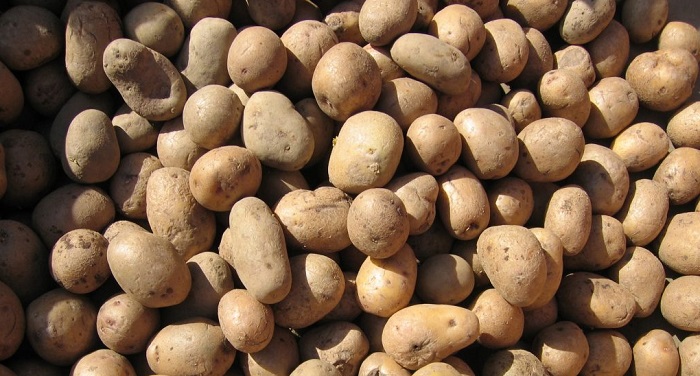
Food security in times of crisis

The Corona crisis affects everyone in the entire world. Our partners worldwide notice the impact on their daily work. We talked to Gulnaz Kaseeva, our director of FairMatch Support Central Asia, in Kyrgyzstan. After two months of total lockdown, the restrictions are now gradually lifted. Some of the borders with neighbouring countries were closed for some time. Trade could not continue. The lockdown also made work of farmers difficult, as it took place in the spring planting season. Luckily, the problems are largely solved. It is not possible though, to forecast at this time, what impact the Corona crisis will have on food security in Kyrgyzstan.
Gulnaz: “Agriculture in Kyrgyzstan is a significant sector of the economy. We produce for example wheat, barley, maize, potatoes, vegetables and fruits. One of the products we work with are seed potatoes. Since 1992, potato production increased in Kyrgyzstan. It’s an important cash crop for many small farmers. Because our country is mountainous, potatoes flourish in the temperate climate of the foothills. Potatoes can be grown in a short period of time and in higher locations than other food products such as rice, wheat or corn.
But we don’t have the options to grow high class seed potatoes ourselves. This sector is not developed in Kyrgyzstan. We buy Elite class seed potatoes from the Netherlands, which then are multiplied in Kyrgyzstan for sale to food potato farmers. Conditions in the Netherlands are very good for the cultivation of seed potatoes. Around 1,600 growers produce more than 950,000 tons of seed potatoes. Of which approximately 70% are exported”.
Start of the agricultural season
In Kyrgyzstan the agriculture season starts in March and in some regions of the country in April. Gulnaz: “We bought 140 tons of Elite class seed potatoes (this results in 3500 tons high quality seed potatoes which allows over 1000 potato farmers to get far higher than average yields) from the Netherlands to start our season. The product is transported by truck to Kyrgyzstan. But due to the Corona crisis our neighbour country Kazakhstan closed its borders. Not only for people to come in and out but also for trading. So our truck with seeds stood at the boarder but was not allowed to come in to Kyrgyzstan. We didn’t know for how long they wanted to keep the boarders closed”.
Another issue came up when the government of the country announced a state of emergency and the whole country was going in a lockdown. Though the government promised that farmers’ spring planting work will not be impeded, they faced obstacles. Seed and fertilizer prices increased. Travelling to purchase inputs was difficult. Farm workers could not move between villages. Supply of diesel for tractors was uncertain.
Issues with food security?
Gulnaz: “These issues raised concerns when you look at food security for our country. When we talk about food security we think about food availability. Having a sufficient supply of food available on a consistent basis. This food can be either locally produced or imported from other places. And food security is about food access, having sufficient resources to obtain appropriate foods for a nutritious diet.
If agricultural producers have problems with planting or can’t get access to quality seeds because of closed boarders, we could face a huge problem with food security. Off course measures should be taken with this crisis. But for the long term of our food security these measures were frightening”.
Positive news from the Ministry of Agriculture and inventive farmers
“Since the beginning of the state of emergency I have been in contact with the Ministry of Agriculture about our concerns. The Minister lobbied with the government of our neighbour country to let trade continue. They succeeded in this. We also got a pass document that allows us to get the seed potatoes through customs clearance and transport them to our partner farmers. Luckily we received our seed potatoes in good condition and our farmers started to plant them.
The farmers in the country proved inventiveness to overcome the obstacles due to the lockdown. In some villages, they set up WhatsApp groups to coordinate input purchases. They discussed with authorities and law enforcement agencies locally to get permission to transport inputs to their fields. Our agronomist provided consultations and organised inputs, tractor services for partner farmers through WhatsApp. Finally, it seems that the agricultural fields have been planted. Due to the high fertilizer prices many farmers may have used less than the optimal fertilizer doses and may get lower yields”.
Food security outlook
If the weather remains favourable, the agricultural production in Kyrgyzstan can be expected to reach similar levels as in previous years despite the Corona crisis. However, Kyrgyzstan depends on imports for essential food items such as sugar, oil and flour. The Corona crisis may result in very high prices for these items. Or the source countries may decide to ban their export to other countries. This results in food security problems for the country. Another risk to food security may be high prices for agricultural products in the domestic market. This would make farmers happy, but would affect food security for poor families who purchase all or most of their food stuff in the market.
Want to know more about our partners and the impact of the corona virus? Please read this blog on e-learning in times of social distancing.

